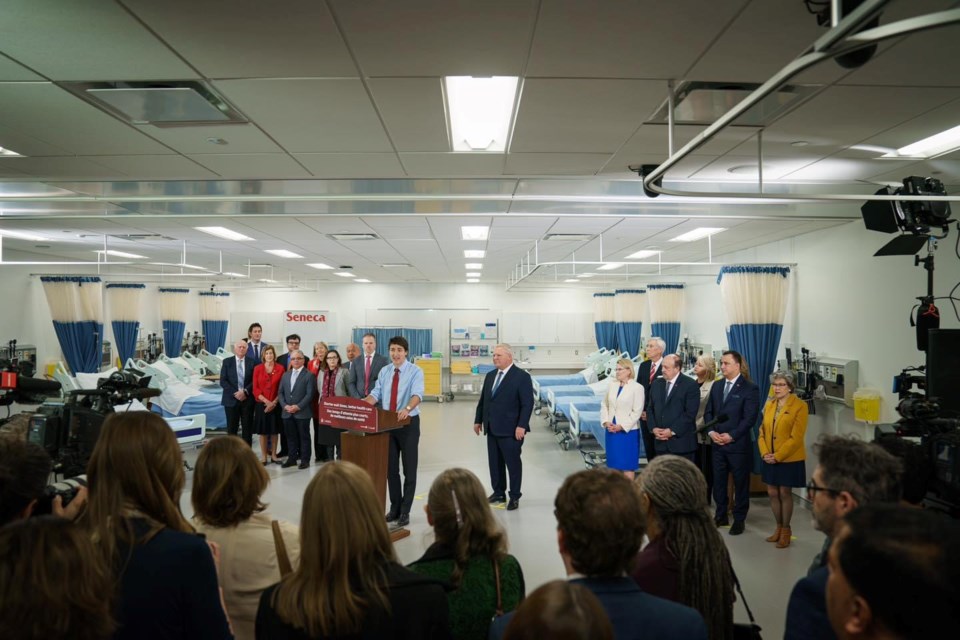Prime Minister Justin Trudeau came to York Region today to announce $3.1 billion in funding to improve Ontario health care, with a focus on ensuring Ontarians have access to primary care.
The new deal comes with conditions, including that the province will create new primary care teams to help people connect to family doctors, add hundreds of new family physicians and nurse practitioners, and five new youth wellness mental health hubs.
Premier Doug Ford and Trudeau, along with associated ministers, were in King City to make the announcement.
“Canadians value our universal public health-care system, but recently this system hasn’t been living up to its promise,” Trudeau said in a news release. “That’s why we’re signing agreements with provinces and territories to help ensure Canadians can access reliable, timely, and safe health care. Today’s agreement with Ontario will increase access to family doctors, reduce backlogs, increase the workforce, and make the health-care system work better.”
The federal government is adding dollars to the health-care system as part of a series of bilateral agreements. Provinces and territories are asked to develop action plans to outline how funds will be spent and how progress will be measured to ensure improvements are being made to the health-care system.
The agreement will also make it easier for Canadian and internationally trained doctors to practise in Ontario, with barriers removed for foreign credential recognition. The province also said it will modernize digital infrastructure in the health-care system.
The agreement will cover the next decade.
“We’re making historic investments in health care to build more hospitals, bring on more doctors and nurses, expand home and community care, and reduce wait times,” Ford said. “We look forward to continuing working with our federal partners to ensure Ontarians get the health care they need and deserve."
The leaders also emphasized the mental health support that will be part of the deal, with the addition of new hubs. There is also a mental health hub in the works for Newmarket headed by Canadian Mental Health Association York Region and South Simcoe.
Federal Minister of Mental Health and Addictions and Associate Minister of Health Ya’ara Saks said the agreement demonstrates commitment to integrating mental health and substance use services into health care.
“We will continue to work together to ensure all Canadians have access to supports and services for their mental health and well-being – when they need them, wherever they need them,” she said.
The Ontario Medical Association welcomed the new deal but warned more funding will be needed. It said there is a crisis in primary care and doctors are overburdened with administration.
“Ontario’s doctors welcome this funding that will help address the most urgent issues.” OMA president Dr. Andrew Park said. “While we tackle the most urgent issues, we also need to ensure we have a long-term, stable funding formula to fix the underlying issues in system and build for future, knowing we have an aging and more medically complex patient population.”
The OMA section on general and family practice, representing family practice physicians of Ontario, said this funding must help solve the severe shortage of family doctors.
“Anything that will increase access to family doctors in Ontario is a good thing,” said Dr. David Barber, the chair of the section. "But it will be important to see the details of this agreement to better understand how this money will increase access to family doctors, for how many people, and in what time frame. We are badly in need of funding for family medicine to get more family doctors working."
The agreement with Ontario is the fifth such agreement announced, with British Columbia, Alberta, Prince Edward Island and Nova Scotia inking similar deals.



